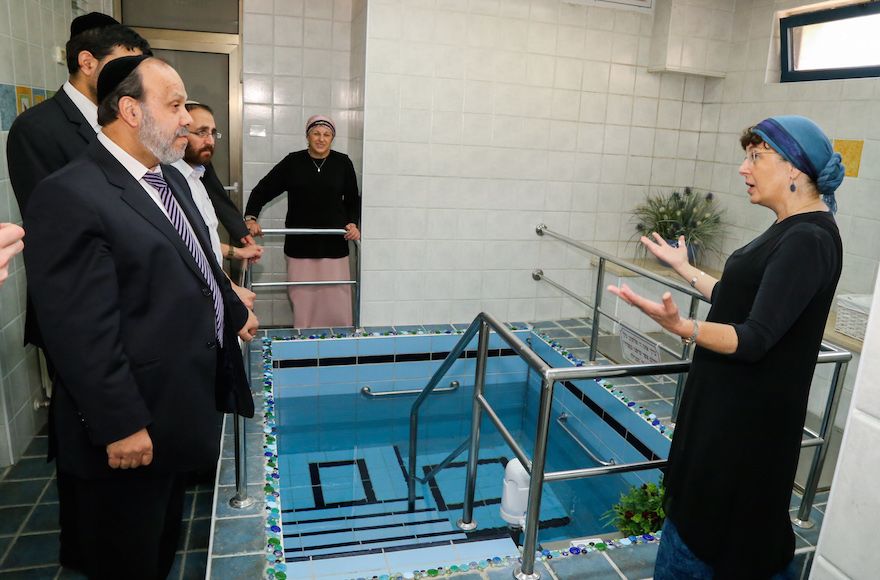Israel’s chief rabbinate agrees to mikvah immersion without attendant
Published June 22, 2016

Israeli Minister of Religious Services David Azulay visits a luxury mikvah in the Israeli settlement of Alon Shvut, as he tours the Gush Etzion bloc on August 25, 2015. (Gershon Elinson/Flash90)
JERUSALEM (JTA) — Israel’s Chief Rabbinate and the Ministry of Religious Services in a filing with Israel’s Supreme Court agreed that the use of an attendant during immersion at a ritual bath will be changed from mandatory to optional.
The state religious bodies were responding to a suit filed by ITIM, a group that supports Israelis in their encounters with the country’s religious bureaucracy.
“Female mikvah bathers can decide for themselves whether to follow this halachic rule (immersing in the presence of the female mikvah attendant), including bathing by themselves or with the company of a friend, while the local religious council and its employees will not condition the bathing with the presence of the female mikvah attendant during the ritual bathing,” read the response, delivered Wednesday morning to the court by the state attorney’s office, according to ITIM.
A mikvah is a ritual bath. Religious authorities believe the supervision of an attendant is necessary to ensure that the woman’s immersion is done according to halacha, or Orthodox Jewish law, including ensuring that every part of the woman, including all of her hair, is under the water at the same time.
Some women have complained of mistreatment by mikvah attendants or a screening that is too rigorous. Victims of sexual abuse also have asked to not be observed during immersion.
The response clarifies that the religious position of the Chief Rabbinate is that immersion in the mikvah must be done in the presence of a female mikvah attendant, and that signs to that effect should hang in all mikvahs.
“The respondents’ position is that the religious council should provide the services of the female mikvah attendants to all female bathers of the mikvah, since their presence is necessary and required according to the position of the Chief Rabbinate, and should act to hang signs at the mikvahs describing the Chief Rabbinate’s ruling that the presence of the female mikvah attendant is mandatory during the bathing,” according to the filing.
In July 2015, ITIM filed the petition with the Supreme Court on behalf of 13 women, which called on the Supreme Court to instruct the Ministry of Religious services to require all religious councils to maintain: “A procedure aimed to protect the personal privacy of all mikvah bathers,” as well as to instruct all Religious Councils to enable bathing without the presence of the female mikvah attendant, in cases where the bathing women demand it.
“I would like to congratulate the Chief Rabbinate on showing compliance and an understating to the needs of the many women who wish to bathe in the mikvahs, thus bringing them, and many other women, closer to this important mitzvah,” Rabbi Dr. Seth Farber, director of ITIM, said in a statement. “In this case, the Chief Rabbinate followed the path of the tradition of Israel, preferring the power of the permit over the power the ban. This tradition is what kept the Jewish community united and cohesive throughout the ages and we believe it is the key to reconnecting the Israeli society with Judaism.”
The Tzohar rabbinical organization called the decision “a further important step forward in promoting Jewish practice and halacha in Israel in an atmosphere of love and acceptance rather than coercion.”














